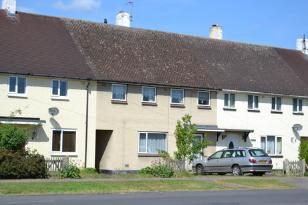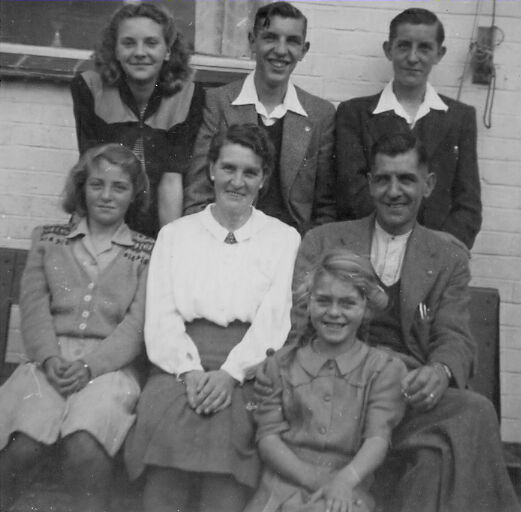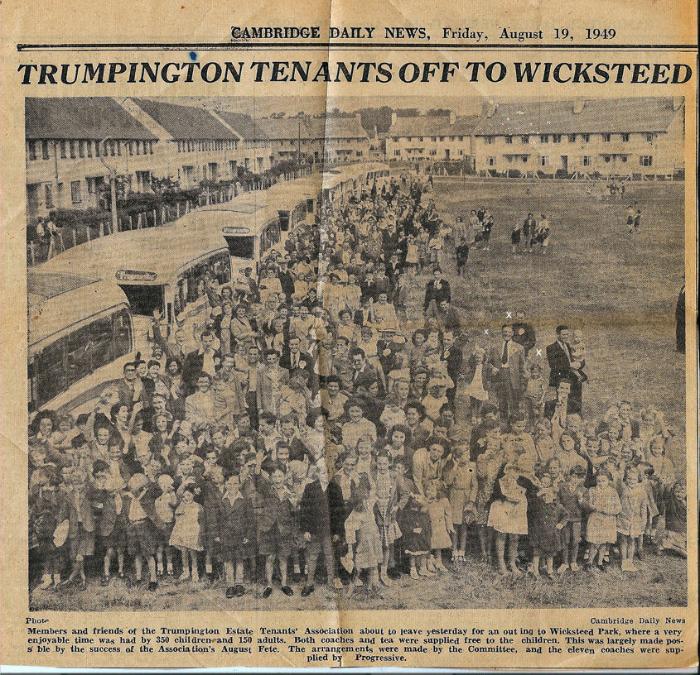Howard Slatter and Brenda Bass
April 2011

The first family to move into 16 Foster Road on the Estate were Sidney and Alice Jones and their five children. Two of those children were present at the On the Street Where You Live meeting of the Local History Group on 31 March 2011, one of whom, Brenda Bass, née Jones, agreed to be interviewed. See also the introduction to The Estate.
HS: Howard Slatter, BB: Brenda Bass
HS. When did you move into the new estate and where from?
BB. 27 December 1946. We came from 98 Riverside in Cambridge, where my mother and we five children had been living in my cousin’s house. We came over to see the new house in Trumpington (I’d never even heard of the place before that) on the 115 bus.
HS. What was built at that point?
BB. The “brown houses” were complete, and the “white houses” along Foster Road and the start of Paget Road were still going up. It really was a building site still. The winter of 1946-47 was a very severe one, and I can remember having lovely slides down snow-covered mounds of building materials and on ice left by leaking taps.
HS. Do you know why your family moved from Riverside?
BB. My father came back to Cambridge after he was demobbed from the army, and my cousin needed the house back, so we had to move out. We had been living before that in Great Yarmouth, but we had moved to Cambridge in 1940 rather than the children being evacuated and splitting up the family. It was either stay in Cambridge or move back to Yarmouth; as we children were now in school in Cambridge that was where we stayed.

HS. I think most of the families moving into the estate came from elsewhere in Cambridge because of being overcrowded or living in poor housing. Can you tell us something about your house in those early days?
BB. Upstairs it had four bedrooms, three of a good size, with a toilet and separate bathroom. Downstairs the kitchen led into the lounge and the hall, with what we called the “front room” at the back of the house, which we only used on special occasions such as at Christmas and other holidays. There were two fireplaces, and the one in the lounge had a back boiler which gave us hot water for the tank in the airing cupboard, where we also had an immersion heater. One of the best things was having electric lights; that was a real novelty, as before we had been used to gas mantles.
HS. Where did you go to school and how did you get there?
B. I had already started at Coleridge that September – as we knew we were moving to Trumpington I was allowed to go there rather than to Chesterton. It was a bus ride into town, then another one out again. My younger sister started at the school in Church Lane and moved to the hall at the Free Church in Alpha Terrace, which was turned into two school rooms divided by a curtain. She was then one of the first pupils to go to the new Fawcett School. Mr Walker, the head there, was married to a lady who had taught me at Brunswick School before I moved to Coleridge.
HS. This newspaper photo shows coaches lined up in Paget Road for a trip out from the estate in 1949. Can you tell us anything about this?
BB. I think this would have been organised by the Trumpington Estate Association. I remember going to Wicksteed Park (in Kettering) with them, and there were also trips to the seaside, possibly Hunstanton. They ran fetes on the green to raise money, with races, decorated bike competitions (I won that one year!), fancy dress and so on.

Trumpington tenants leaving for a day trip to Wicksteed Park, August 1949, with the caption “Members and friends of the Trumpington Estate Tenants’ Association about to leave yesterday for an outing to Wicksteed Park, where a very enjoyable time was had by 350 children and 150 adults. Both coaches and tea were supplied free to the children. This was largely made possible by the success of the Association’s August Fete. The arrangements were made by the Committee and the eleven coaches were supplied by Progressive.”